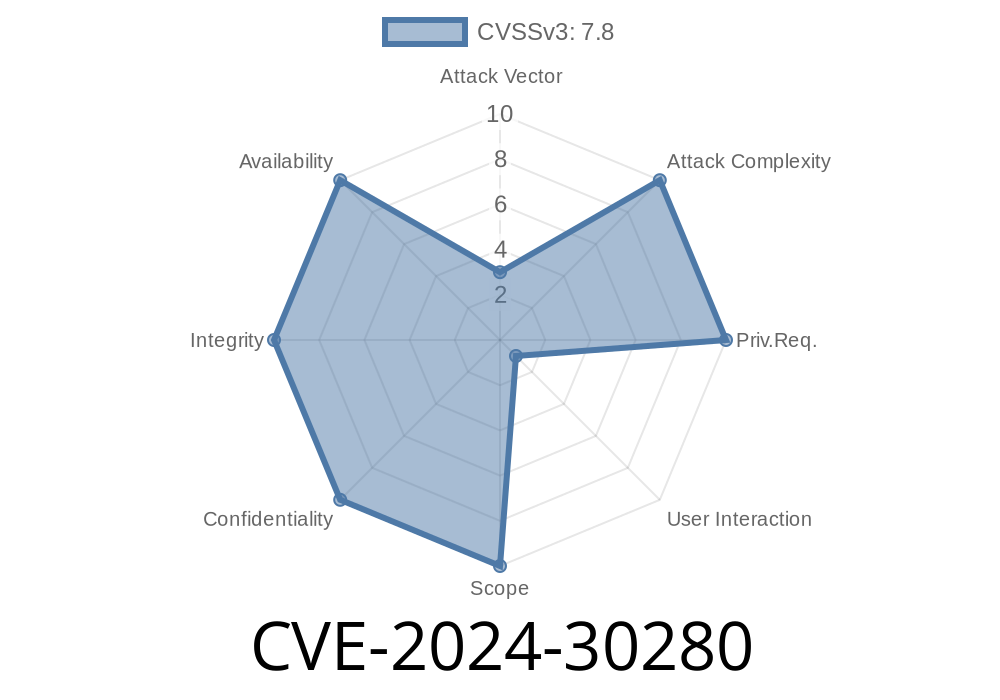Adobe Acrobat Reader is one of the most widely used PDF viewers on the planet, but with popularity comes attention from attackers. In June 2024, security researchers identified a critical issue—CVE-2024-30280—impacting versions 20.005.30574, 24.002.20736, and likely earlier releases of Acrobat Reader. This vulnerability could allow attackers to run code on a victim’s machine just by getting them to open a malicious file.
Let’s break down how this works, why it’s dangerous, show how the code might look in attack scenario, and how Adobe responded.
What is CVE-2024-30280?
CVE-2024-30280 is an *out-of-bounds read* vulnerability. That means the vulnerable application (in this case, Acrobat Reader) reads data outside the boundaries of pre-allocated memory when parsing (interpreting) a specifically crafted file—such as a PDF.
This might not sound serious, but reading from the wrong memory areas can lead to leaks of sensitive data, crashes, or, worst case, code execution. In CVE-2024-30280, a smart attacker can trigger this condition by sending a weaponized file—once the victim opens it, the attacker’s code could run under current user privileges.
How Does the Vulnerability Work?
Imagine Acrobat Reader is parsing PDF file sections, expecting a certain length or structure. An attacker crafts a PDF that claims it contains more information than it actually does. When Acrobat tries to read beyond the real end, the “out-of-bounds read” happens.
Or, with advanced exploitation, they might execute malicious code (Remote Code Execution, RCE).
All a user has to do? Open the attacker’s PDF. No extra clicks required.
Proof of Concept: How a Crafted PDF Triggers the Bug
For ethical reasons, we don’t distribute weaponized files. But here’s a simplified illustration of how an attacker might abuse this bug at the code level:
// Inside Acrobat's PDF parsing routine:
function parse_xref_table(buffer, length) {
for (int i = ; i < buffer.read_uint16(); i++) { // <-- Attacker controls the count
uint32_t offset = buffer.read_uint32();
// ... further parsing ...
}
}
If the PDF says there are xFFFF entries, but the actual buffer is much shorter, Reader will still try to process all, leading to access beyond buffer’s range.
An attacker sets up the PDF headers and structures to trigger this code path and, with some carefully crafted values, arranges for Acrobat to:
Victim opens the PDF in Acrobat Reader (20.005.30574 or 24.002.20736 or older)
4. Out-of-bounds read occurs: Reader processes bogus structures, attacker code executes, running with victim’s user rights.
5. Attacker now has access to run further payloads, install spyware, or persist in the victim’s environment.
We can’t use actual exploit code, but the attacker’s payload might look something like
// Malicious embedded JavaScript in PDF (for a memory leak/exploit)
var buffer = new Array(x100);
for (var i = ; i < buffer.length; i++) {
buffer[i] = x41414141; // Fills memory with favorite pattern (e.g., 'AAAA')
}
// The malformed PDF table would subtly overwrite or out-of-bounds read into this space.
The key takeaway: the exploit doesn’t require advanced scripting; the vulnerability triggers before security mechanisms (like Protected View) can intervene, in some cases.
Adobe’s Response and Patch
Adobe assigned CVE-2024-30280 a high severity, and released patches in June 2024. If you use Acrobat Reader, update to the latest version immediately.
Patch download:
🠒 Adobe Acrobat Reader Download Center
Security bulletin from Adobe:
🠒 Adobe Security Bulletin APSB24-40 (CVE-2024-30280)
Original references:
- NVD entry for CVE-2024-30280
- Rapid7 analysis (if available)
Conclusion
CVE-2024-30280 is a reminder that even routine tasks—like opening a PDF—can be risky if your software is out-of-date. Attackers are always looking for “file parsing” bugs, knowing that one reckless click can mean system compromise. If you haven’t updated in a while, now’s the time.
Timeline
Published on: 05/23/2024 09:15:09 UTC
Last modified on: 06/04/2024 17:39:22 UTC
